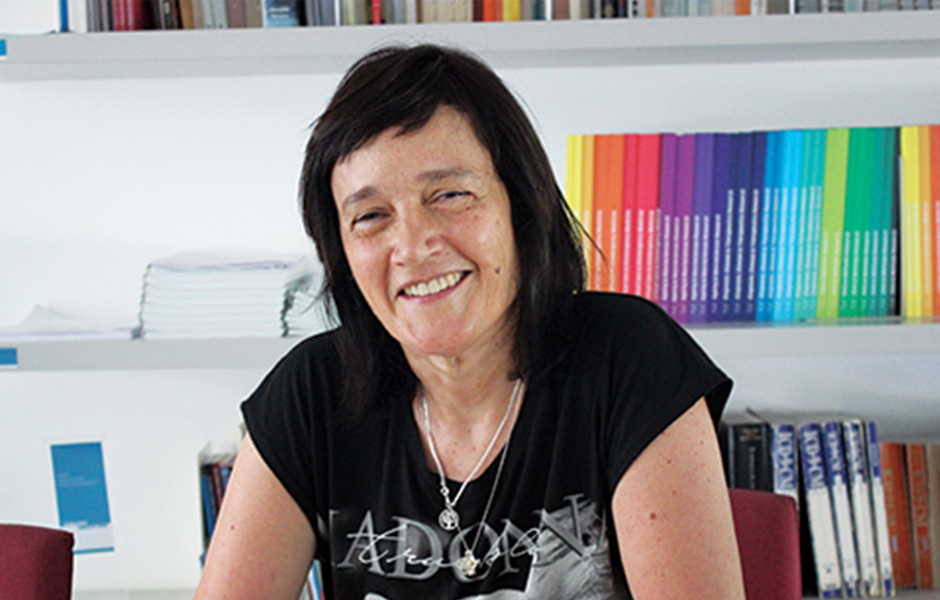Cristina Granja is the Principal Investigator of CriticalMed. She is a medical doctor specialized in Anaesthesia and Intensive Medicine. Besides also having competence in Emergency Medicine, she is the head of a hospital service, a professor and a mother. She has reached the top of her career, but she still is very critical –especially with herself – protective of her team, of which she is proud, and completely devoted to her patients.
She wanted to be an Agronomist because she loved contact with nature, but destiny led her to Medicine in 1978. “Agronomy could only be studied in Lisbon and more than half of my class went to Medicine. One day a friend called me and asked me if I wanted her to enrol me. I said yes”, she recalls.
She studied at the Faculty of Medicine of the University of Porto, completed her internship in Anaesthesia in 1990 and worked at the Emergency and the Intensive Care Services of the Hospital of São João until 1997, when she went to work at Pedro Hispano Hospital in Matosinhos. She took over the responsibility for the Medical Intensive Care Service in 2005, the same year she completed her PhD on quality of life and post-intensive sequelae in survivors. “It was a very interesting stage of my life, a golden period”, she confesses.
She left the hospital in 2012. It was a turning point in her life, the only period during which she did not work in Intensive Care and did not have to face the death of her patients and the pain of their relatives, which she admits is a “huge burden”. On the day she took her Agregação Exam (tenure), she received an invitation to go work at the Hospital of Faro – Hospital Centre of Algarve. She also went to an interview at a hospital in England, where she was expecting to get an irrecusable job offer. She preferred to stay, though. “I had my story in Portugal”, she explains, also convinced by the mild climate and warm welcome she had upon her arrival in Algarve.
In 2013, she took over the Direction of the Intensive Care Service, which she has held until now, balancing the job with that of being a Full Professor at the University of Algarve (UAlg). “I really enjoy being in Algarve. I think I’m more useful there because there’s a huge shortage of doctors. But it was Ryanair that made Algarve part of the country. It was not the Government or a regional authority. ”
She has been a researcher at CINTESIS from the very beginning, coordinating the research group CriticalMed, whose membership – mainly doctoral students of the Doctoral Programme in Clinical and Health Services Research – has been increasing; a handful of young people who investigate in areas like Infection and Sepsis, End-of-Life Ethics or Effects of Sedation in the context of Anaesthesia. A multicentre study of patients with cognitive dysfunction caused by sedation is also in progress, based on follow-up consultations that take place after patients are discharged from intensive care. The consultation service is similar to what she had already implemented in Matosinhos.
She has authored more than 40 papers published in national and foreign journals, with more than 1,700 citations, focusing on the area of in-hospital emergency and follow-up of critically ill patients. For Cristina Granja, research “helps us to perceive what the rest of the world is doing and to reflect on what we can do better for the patients and the organization of services, but it only makes sense if it is used to improve clinical practice and not for curriculum building or career rising purposes. My only ambition is to take good care of the sick.”
1-Year Ambition
I do have to bring my doctoral students to the completion of their projects. I could never leave them behind. In June, I will become the Editor-in-Chief of the Journal of the Portuguese Society of Anaesthesiology. It will be a way of reciprocating the tribute the Portuguese Society of Anaesthesiology paid to me in 2015.
10-Year Ambition
I can only plan 1 year ahead, and that is risky enough. I think the world is highly volatile. I really don’t have a clue of what I’ll be doing in 10 years from now, but I think I’ll be retiring. I am actually somehow eager to do that. I want to take care of my grandchildren, that is, when I have them (laughs).
Life Beyond Medicine and Research
On weekends I’m with my family and with friends. I go to Casa da Música a lot. I used to own a School of Music and my children play piano and violin. In Algarve, I discovered the Ria Formosa lagoon, where I practice canoeing and sailing, passions of mine when I was a student.

